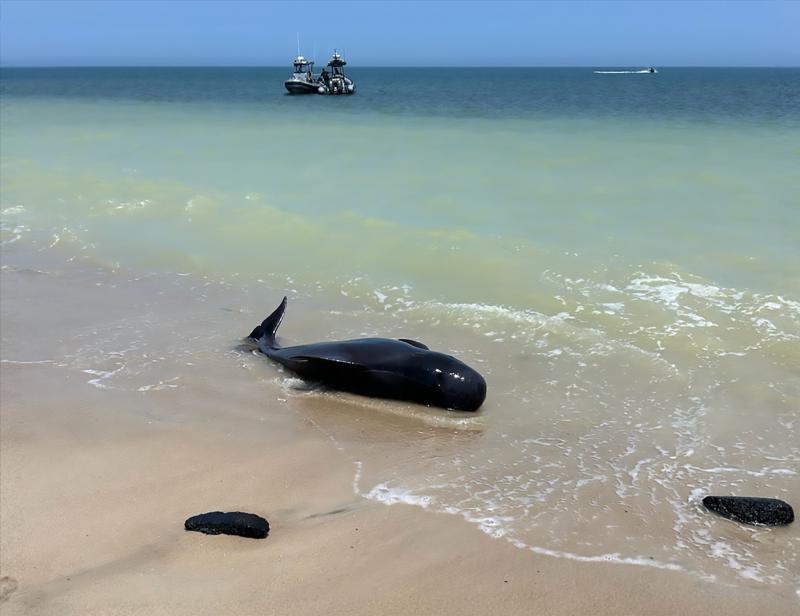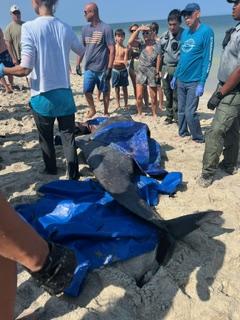Members of the Marine Education, Research and Rehabilitation Institute responded to a short-finned pilot whale that was stranded on the beach north of the Indian River Inlet Aug. 5.
The juvenile female whale was washing in and out of the surf, with short spurts of swimming followed by repeated attempts at beaching. MERR officials said the whale was often in the surf zone, which is a dangerous phase for any whale or dolphin stranding. The whale could no longer control her swimming or body movements in this shallow area, and she was often crashing into the cement and other debris in that area, while waves were washing over her blowhole, causing water to enter her lungs.
MERR’s stranding response team was able to rescue the nearly 700-pound whale from the treacherous surf zone. Based upon her weight and the turbulent wave action, the effort would not have been possible without the help of the state park rangers, the crew from DNREC’s Shoreline and Waterways Management Section, and members of the public. The whale was successfully contained on a rescue stretcher and carried to an awaiting rescue van. The whale stretcher was suspended in a special frame that helps to alleviate the pressure of the whale’s body weight, while moist towels were placed upon her to keep her skin from drying out.
As is the case with most whales and dolphins that beach themselves, the whale was extremely debilitated and was in the process of dying. Unfortunately, she didn’t survive, but the rescue efforts allowed her to die a more peaceful death. MERR conducted a necropsy the following day to try to determine a possible cause of death. MERR determined the whale had not been eating for an extended period of time, and had a heavy intestinal parasite load. Samples will be processed and diagnosed, which may shed light on any underlying conditions, such as illness.
“Special thanks go out to the staff at All Creatures Veterinary Service, and to all of the caring members of the public who reported this animal and who watched and hoped for the best for her,” said MERR Executive Director Suzanne Thurman. “Thanks to all involved. We were able to greatly minimize her suffering.”
Short-finned pilot whales are present in the Mid-Atlantic, but usually found in deeper offshore waters where they actively hunt for prey. They are very social animals who tend to live in extended family pods. They have strong familial bonds, especially between mothers and calves. This young individual may have been separated from her pod as she became more and more debilitated. She was just under 9 feet in length. Had she reached full size, she might have exceeded 18 feet in length. The life expectancy for a female is about 60 years.
MERR provides rescue and response for stranded marine animals that occur throughout the state of Delaware. MERR is a 501(c)(3) organization dedicated to the conservation of marine mammals and sea turtles and their habitat. Anyone who notices a marine mammal or sea turtle in distress in Delaware, contact MERR’s 24-hour hotline at 302-228-5029.






















































